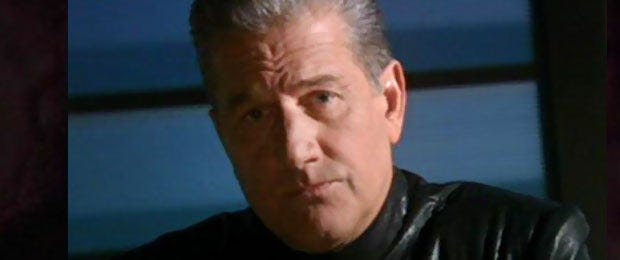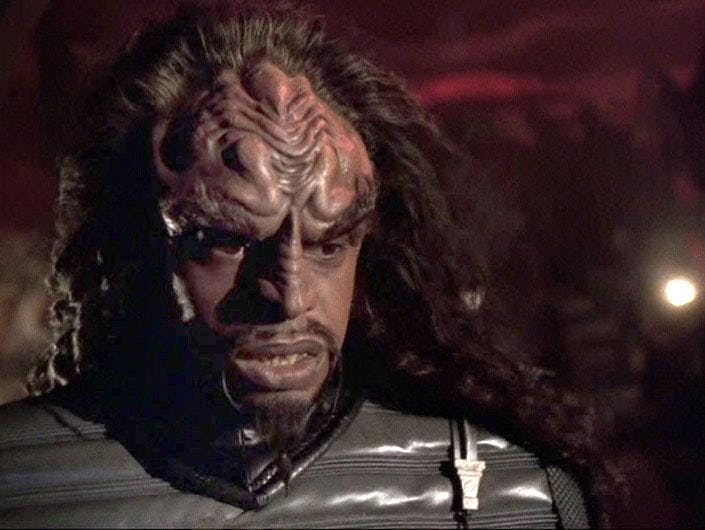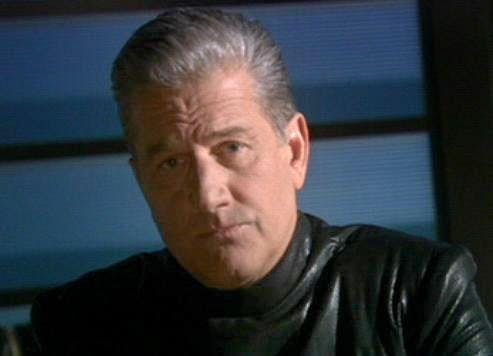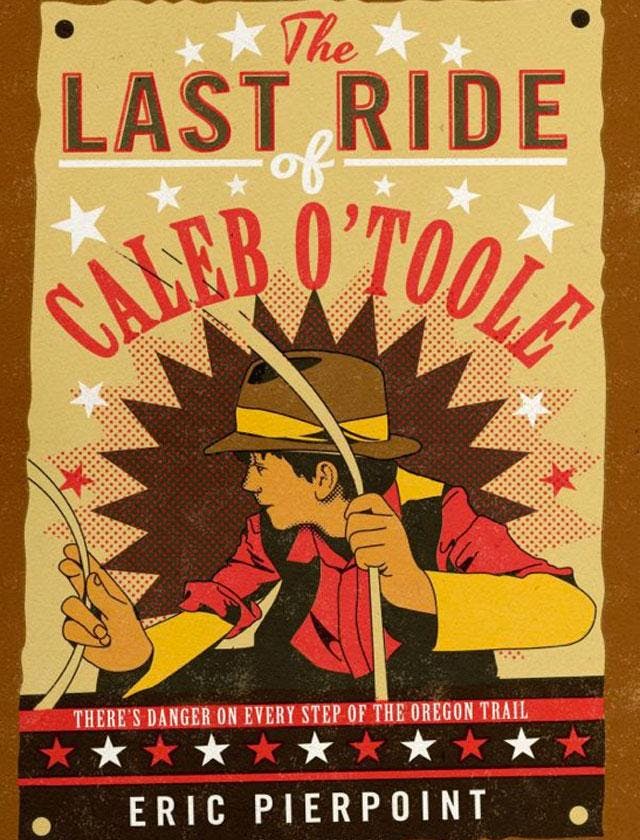Published Oct 4, 2013
EXCLUSIVE INTERVIEW: Frequent Trek Guest Eric Pierpoint, Part 2
EXCLUSIVE INTERVIEW: Frequent Trek Guest Eric Pierpoint, Part 2

Eric Pierpoint, during the recent Creation Entertainment Official Star Trek Convention in Las Vegas, chatted with a female fan for several minutes, signed an autograph, posed for a photo and shook the woman’s hand goodbye. “Great guy,” the fan said to her friend as they walked away. “Couldn’t be nicer. Loved him on Star Trek. Loved him on Alien Nation. And he still looks great.” That fan didn’t realize StarTrek.com was standing right behind her, but we were. When we mentioned the comments to Pierpoint, he smiled and explained, “It’s why I’m here. They’re here to see me and I’m here to see them. If you can’t have some fun with it, why bother, right?”
StarTrek.com then sat down next to Pierpoint to conduct an extensive interview, one that was interrupted several times as Pierpoint happily interacted with fans. It made sense that his table was busy. After all, he played Voval in the Next Generationepisode “Liaisons,” Captain Sanders in the Deep Space Nine hour “For the Uniform” and Kortar in Voyager’s “Barge of the Dead,” And on Enterprise he played Shiraht in “Rogue Planet” and recurred across four episodes as the Section 31 operative Harris. Pierpoint, during our chat, addressed his Trek work and his other big sci-fi credit (Alien Nation), spoke animatedly about his new book, The Last Ride of Caleb O’Toole, and touched on additional points as well. Below is part two of our conversation.
Kortar, your Klingon on Voyager was supposed to be the first Klingon, at least within B’Elanna’s vision…
PIERPOINT: He’s like the oldest Klingon in Klingon folklore. He’s the first warrior. That was me thinking, “OK, this guy is setting it up for all the other Klingons coming to follow.” I thought about that I said, “This is very Shakespearean, in a way, very classic.” He perceived everything in terms of the warrior mind, so everyone is under suspicion. So it’s this way of controlling of controlling and exuding your power over others. So, once I was getting in the makeup at 2:45 in the morning, it was a very cool experience because you basically watch yourself be built. It was the same with Alien Nation. Once you get the makeup on, you begin to match the insides with the outsides and, vocally, you begin to find where that is because you want it to be real coming from this character. You don’t just slap makeup on and talk as if you’re from wherever in the U.S. I think it’s why they liked classically trained actors on the show, because they could go to that place. You don’t sound like you’re from the Valley. And that was the longest day I ever shot anything. We shot almost 24 hours straight. It was the last day of shooting that episode and they had to start the next one, so they to finish and we were doing double and triple overtime.

My funny story about that was that at 3 o’clock the next morning I was on the freeway. I got pulled over by the cops for weaving. I was still in this black tee-shirt. I had crap all over my head left over from makeup. He said, “I pulled you over for weaving.” He gave me the drunk test. He said, “Follow my finger.” But I never got out of the car. He said, “What have you been doing?” I said, “I haven’t been drinking. I’ve been Klingon for the last 30 hours.” He just laughed and said, “You’ve been working on Star Trek?” I said, “Yeah, I’m exhausted. I’m sorry.” He asked if I could drive home OK and he said, “Well, I’m not going to give you a ticket for driving while Klingon.”
Next was Shiraht on Enterprise. He hunted Eska and wore a very colorful outfit…
PIERPOINT: Talking about eating intelligent game on a dark planet. Didn’t one of the Original Series episodes have a similar theme? I think they were re-doing that. What shakes me up about that is that I hope I’m not eating intelligent game on this planet as a human, in Ralph’s Supermarket. But it makes you think where that line is crossed. So, in the playing of it, you just play whatever morality you’re given as a bad guy and you’re going to commit to that. I didn’t spend a lot of time saying, “My character wouldn’t do that.” But the episode, it was kind of the intelligent species versus the more physical species on this planet and it’s kind of disgusting. I eat everything, but I have little pangs, guilt, about eating certain things. And you mentioned the outfit. It was like a camouflage Nehru jacket. And I had the Fabian forehead.

Let’s talk about Harris, whom you played in the episodes “Affliction,” “Divergence,” “Demons” and “Terra Prime.” First, did you come in knowing that he would be a recurring part?
PIERPOINT: I knew he was going to come back, but not as much as he did. That was really kind of a cool experience because I was actually called in to play a different alien and, in the middle of it, one of the producers said, “No, just stop. You’re going to play this other guy.” They said, ‘This is going to work, believe me. He’s going to come back.” I said, “What is it?” He said, “It’s this deep, secret, kind of evil black ops thing.” So he gave me the scene and I went, “Holy crap.” So I showed up for wardrobe and they tried to fit me into some guy’s uniform that was used in the past, some thin guy. I said, “Why don’t you just build me my own brand-new costume?” They said, “Well, the series is coming to an end and we don’t want to spend any money.” They said, “Would you mind putting on this girdle.” I went, “What? I’m not a fat guy. I’m in shape!” But it was funny. They made this leather suit for me and it was hard to walk in. But I had a lot of good, hard stuff with Dominic (Keating). I mean, who doesn’t like to play the slightly charming bad guy? That’s a fun combination.
Last Trek question. If we let you play one of your Trek characters one more time, which would you choose to play and why?
PIERPOINT: I feel like a lot of the characters had a full arc, even if it was just one episode. The one that didn’t, or that had the least was Captain Sanders. So I would say Captain Sanders, because it was abbreviated. He didn’t get to fully form because he was only in it for a couple of scenes. I’d like to have seen how I’d have played this leading man captain and where they might have taken that.

Your book, The Last Ride of Caleb O’Toole, just came out a few weeks ago. It’s a historical fiction-action tale…
PIERPOINT: It’s for what they call middle readers, which are ages nine to 14. It takes place in 1877 on the Oregon Trail. It’s about three orphans trying to survive. They have to go from Kansas all the way to the Bitterroot Mountains in Montana. I did a lot of research. I went on the road with my dog. We did the whole trail. I stopped and interviewed people. I took photos and stayed in little cabins and motels and truck stops and visited a lot of the areas where this book takes place. I wanted to just visually see what my characters might have seen except, of course, for the freeways, cars, power lines and everything else. But the idea was to see the landscape and get a sense of what that felt like, what was growing there. It’s my first novel. It’s out from SourcebBooks (click HERE for details), and it’s in schools and libraries. It’s been really, really well received by critics, too. So, so far, so good.
Why a book?
PIERPOINT: I don’t know. My manager kept bugging me for years. “You’re a great storyteller. Start writing.” So, about seven or eight years ago I started writing. All of them were optioned, so I was having some luck. None of them got made, however. But she loved the story of Caleb O’Toole, which I’d done as a screenplay. She said, “Can you turn that into a novel,” and I said, “Yes.” Doing that took me almost two years, and then it went through the whole editing process and publisher’s notes and all that. So they gave me a three-book deal, but they didn’t want a sequel. They wanted something completely different. So now I’m researching the Revolutionary War and I’m going to Virginia, but without my dog, unfortunately. I’ve been unearthing wonderful information that has to do with the spy system during the American Revolution. So I’m using a young hero and a young heroine, a 12-year-old boy and a 16-year-old boy. So I’m working on that.
And on the acting front? Are you still recurring on Hart of Dixie?
PIERPOINT: I do recur every now and then on that, yes. I play the father of one of the stars, Scott Porter. I’ve done several of these characters: the alcoholic heads of law firms who are also bad fathers. Before that it was fire chiefs and before that it was police chiefs, which I did on Parks & Recreation. I don’t know what happens. It’s just the way it goes.
Click HERE to read part one.
